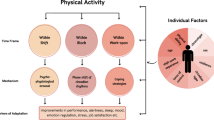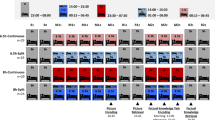Abstract
PRESSURES of work often force people to stay up late, attempting to commit material to memory during the early hours of the morning. ‘Burning the midnight oil’ in this way often seems reasonably efficient at the time, despite the fact that a wide range of physiological and psychological circadian (24 h) rhythms are then at their lowest point. However, recent research would predict that although people's immediate memory for the material studied might be reasonably good, much more will be forgotten with time than if the learning had taken place at a more ‘normal’ time of day. This prediction was tested and verified on a group of part-time night workers. An ‘in service’ training film was shown at either 2030 h or 0400 h. When tested immediately after seeing it, memory for the film was, if anything, slightly better at 0400 h than at 2030 h. However, the group that was shown the film at 0400 h forgot more than twice as much over a 28-d period as the group shown it at 2030 h. Thus, although studying late at night might seem to be efficient at the time, long-term retention of the material will be rather poor.
This is a preview of subscription content, access via your institution
Access options
Subscribe to this journal
Receive 51 print issues and online access
$199.00 per year
only $3.90 per issue
Buy this article
- Purchase on Springer Link
- Instant access to full article PDF
Prices may be subject to local taxes which are calculated during checkout
Similar content being viewed by others
References
Winch, W. H. J. educ. Psychol. 3, 18–28, 75–82 (1912).
Gates, A. I. Univ. Calif. Publs Psychol. 2, 1–156 (1916).
Blake, M. J. F. Psychon. Sci. 9, 349–350 (1967).
Baddeley, A. D., Hatter, J. E., Scott, D. & Snashall, A. Q. Jl exp. Psychol. 22, 605–609 (1970).
Hockey, G. R. J. & Colquhoun, W. P. Aspects of Human Efficiency—Diurnal Rhythm and Loss of Sleep (ed. Colquhoun, W. P.) 1–23 (English Univ. Press, London, 1972).
Folkard, S., Monk, T. H., Bradbury, R. & Rosenthall, J. Br. J. Psychol. 68, 45–50 (1977).
Folkard, S., Monk, T. H. & Lobban, M. C. Ergonomics (in the press).
Lobban, M. C. & Nessling, R. J. Physiol., Lond. 267, 24–25P (1977).
Folkard, S. & Haines, S. M. J. Physiol., Lond. 267, 25–26P (1977).
Author information
Authors and Affiliations
Rights and permissions
About this article
Cite this article
MONK, T., FOLKARD, S. Concealed inefficiency of late-night study. Nature 273, 296–297 (1978). https://doi.org/10.1038/273296a0
Received:
Accepted:
Issue Date:
DOI: https://doi.org/10.1038/273296a0
Comments
By submitting a comment you agree to abide by our Terms and Community Guidelines. If you find something abusive or that does not comply with our terms or guidelines please flag it as inappropriate.



